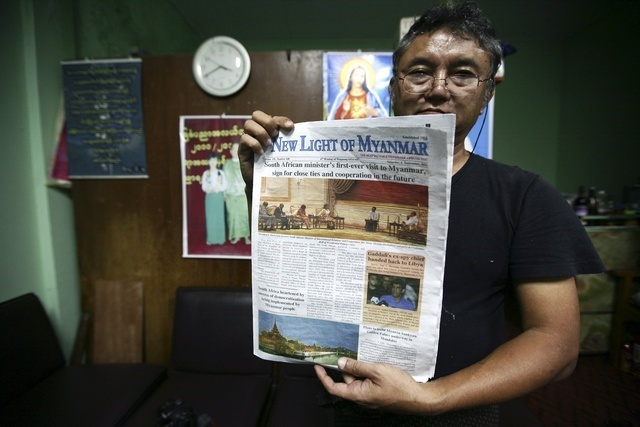Editors at private newspapers aren’t happy with Burma’s new public service media bill that was passed earlier this week by the Union Parliament, which aims to transform the country’s state mouthpieces into public service media outlets (PSMs).
In accordance with the legislation, a 15 member public service media council –whose representatives will be nominated by the president, and the speakers of the Upper and Lower Houses – will oversee the transition of government publications into PSMs.
According to the bill, the government will provide PSMs with 70 percent of their budgets, while the remaining 30 percent must be procured through advertising or investments.
However, editors from private outlets say that allowing PSMs to generate income while also receiving government funds will create an uneven playing field for Burma’s fourth estate.
“So the [PSM] will also make income from daily newspapers through sales and advertisement while also receiving [state funds] – this would be unfair for private media and will likely stir up some controversy,” said Thiha Saw, chief editor of Myanmar Dhana magazine.
The editor went on to question why there needs to be a public service media council, when the Myanmar press council and the media council already exist.
According to the chief editor of the Golden Fresh Land daily newspaper Pho Thaukkyar, the provisions in the bill are unfair and could undermine private outlets.
“I don’t even accept the government publishing newspapers, let alone the [PSM] bill,” said Pho Thaukkyar.
“I’ve never heard of any country’s government publishing a newspaper to fight the private sector. This is not even fair competition; it’s more like they are attacking us with an upper hand and I see that this bill is meant to protect their advantage.”
Last June, a government delegation was sent to Scandinavia where they met with numerous media outlets to study PSMs. Following the trip, Burma’s Deputy Information Minister Ye Htut said the government would take gradual steps while transforming the state mouthpieces.
“The conversion of state mouthpiece broadcast media into public service news outlets is crucial to Burma’s media reforms,” said Shawn Crispin, the Committee to Protect Journalist’s Southeast Asia representative.
“For this transformation to work, however, it should be steered by journalists rather than government authorities. It’s high time Burma had an independent broadcast media that serves the people rather than the military.”
While the international community has lauded the quasi-civilian government’s move to abolish pre-censorship and relax several restrictions targeting the fourth estate, many of the country’s draconian laws remain on the books.
In March, officials tried to push a new printing and publishing enterprise law through the parliament; however, the bill has been tabled until a new legislative session commences in June after meeting fierce resistance from the country’s journalists.



